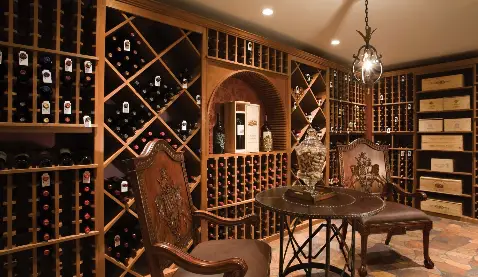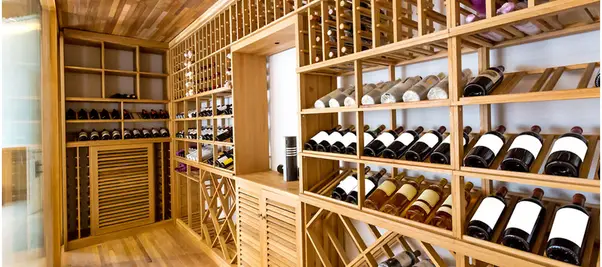
A wine cellar is more than a storage space—it’s a sanctuary for your collection, where each bottle rests until the moment it’s ready to be savored.
Traditionally tucked underground, cellars offer the cool, dark atmosphere wine needs, but without careful balance, nature alone isn’t always enough.
While temperature often takes center stage, humidity is the quiet guardian of fine wine.
Too little moisture, and corks begin to dry and contract, allowing air to slip inside—transforming treasured vintages into spoiled memories.
A dedicated wine cellar humidifier ensures the problems don’t happen. Working seamlessly with your cooling system, it maintains the perfect level of moisture in the air, creating a stable environment where wines can mature gracefully.
For those who see wine not just as a drink but as an experience, a humidifier is more than a practical accessory—it’s a promise. A promise that when the cork is finally pulled, the wine within is exactly as it was meant to be: elegant, timeless, and exquisite.
Let’s take a look at why it’s so essential to control the humidity of your wine cellar in more detail below.
Why Should You Worry about the Humidity Here?
If your goal is to enjoy wine at its peak, then the environment where it rests becomes just as important as the bottle itself.
Both temperature and humidity play a decisive role in how gracefully your collection matures. Ignore them, and you may find that years of patience yield little more than disappointment.
Wine corks, crafted from the bark of the cork oak tree, are wonderfully natural—but also vulnerable. Without the right level of humidity, corks can dry out, contract, and let air seep in, spoiling the wine long before its time.
So, what’s the sweet spot? The ideal humidity for a wine cellar hovers around 70%. At this level, corks remain supple and secure, ensuring every bottle is sealed in perfection.
1- Balance
Too little humidity, and your corks wither. Too much, and new problems arise—labels may peel or discolor, musty odors can develop, and even the packaging of your prized vintages may suffer.
Mold can also find its way into the cellar, affecting not only the bottles but the shelving and walls themselves.
Beyond protecting corks, humidity plays an equally important role in the bigger picture:
- Preserving Wine’s Essence – The right level of humidity slows oxidation, helping wine retain the aromas, flavors, and textures the winemaker intended.
- Protecting Long-Term Value – Collectors know that damaged corks or labels reduce a bottle’s market worth. Stable humidity safeguards both the integrity and investment value of your collection.
- Caring for the Cellar Itself – Proper humidity keeps wooden racks and flooring from drying out, while preventing mold from taking hold when levels run too high.
2- Consistency is key
A cellar that swings between extremes of dry and damp air is just as harmful as one that never reaches the right level. That’s why humidity must work hand-in-hand with temperature, creating a stable microclimate that lets your collection thrive in silence.
Ultimately, proper humidity control offers more than technical precision—it offers peace of mind. It allows you to walk into your cellar, select a bottle, and uncork it with complete confidence, knowing the wine has been cared for exactly as it should.
With the right balance, your cellar is no longer just storage—it becomes a timeless vault of experiences, waiting to be savored.
3- Humidifier or dehumidifier for wine cellar
Although getting an excellent cooling system and humidifier is essential for residential and commercial wine cellars, before investing, do check the humidity of your place to judge whether you need:
- A humidifying device to enhance the moisture levels OR
- A dehumidifier for a cellar to extract the excess moisture that may be caused due to various reasons
A good humidifier with a self-regulating humidity feature (or humidistat) is an excellent option to invest in.
As it can monitor and control the relative humidity to the most desired levels according to the place, this is one of the most suitable options for your small size wine cellar at home.

Choosing the Correct Humidification System for a Wine Cellar
Maintaining the ideal relative humidity (RH) in your wine cellar isn’t just about the humidifier you choose—it begins with the construction itself.
Proper insulation, vapor barriers, and sealing in the walls and ceilings greatly reduce the amount of added moisture required.
If your cellar is well-constructed and tightly sealed, you may only need minimal humidification.
But in cellars with lighter construction or weaker insulation, a reliable humidification system becomes essential to keep your collection aging gracefully.
When selecting the right system, here are the key factors to consider:
✅ Automatic Controls
Your humidifier should work intelligently, adjusting itself to maintain the proper RH without constant manual intervention.
High-quality systems come with built-in digital humidistats and thermostats that automatically monitor and regulate humidity.
This ensures consistent performance tailored to the size and construction of your cellar.
✅ Capacity and Construction
Choose a system with the capacity to handle your cellar’s volume and conditions.
Units typically range from 400 cubic feet to 8,400 cubic feet, so it’s wise to consult with an installation specialist to find the right fit.
Beyond capacity, pay attention to build quality. Look for systems made with rust- and corrosion-resistant materials that can withstand moisture exposure over time.
✅ Safety and Maintenance
Safety should never be overlooked. Opt for a system with a wetted-pad design, which introduces humidity as a fine vapor—minimizing the risk of white dust, bacteria, or other airborne particles.
For convenience, select a unit that doesn’t require manual refilling and includes an automatic drainage system to flush out mineral buildup, keeping maintenance minimal.
✅ Types of Wine Cellar Humidification Systems
Finally, consider which style of humidification system best suits your cellar:
- Through-Wall Units are compact and freestanding, installed directly through the cellar wall to deliver moisture inside. These are ideal for smaller spaces or private collections.
- Ducted Systems distribute humidified air through ductwork, providing even coverage for larger cellars or expansive collections. They integrate seamlessly into the design and are the preferred choice for serious collectors.
For a small residential cellar, a portable air conditioner can be a convenient option for cooling, while a quality air humidifier will help preserve the right humidity levels.
For larger or commercial wine cellars, however, a more robust solution is essential. Brands such as Wine Guardian, CellarCool, and WhisperKOOL are widely respected for their reliable cooling and humidification systems, making them excellent choices when investing in long-term preservation.
Another highly efficient option is the Centrifugal Atomizing Humidifier, designed to regulate both temperature and humidity effectively. By ensuring the perfect balance of climate control, these systems allow your collection—whether modest or extensive—to age gracefully, protecting the integrity of every bottle.
The conclusion
In the end, the right humidification system is more than just equipment—it’s an investment in the life of your collection.
By choosing a system that suits your cellar’s size, design, and construction, you create a perfectly balanced environment where every bottle is protected, preserved, and allowed to mature with grace.
A well-designed cellar is not just storage—it’s a sanctuary for your wine, ensuring that when the moment comes to uncork a bottle, it delivers the experience exactly as it was meant to be.
Meen Smith is a nurse by profession who loves writing online, spending time with her family and caring for the elderly. She has already worked as an associate editor on various moms, babies, home appliances, kitchen, and healthy living blogs. In her spare time, she also enjoys drawing, reading/writing kindle eBooks and improving her skills a bit.
